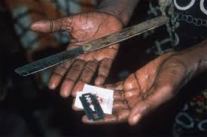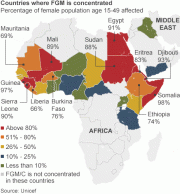 On the 14th March The Guardian reported that for the first time a doctor will stand trial in Egypt on charges of female genital mutilation (FGM). 13-year-old Sohair al-Bata’a died following an alleged operation in his clinic last year. FGM has been banned in Egypt since 2008 but may doctors still carry out the operation on a private basis, as parents see it as an acceptable ‘rite of passage’ for their daughters.
On the 14th March The Guardian reported that for the first time a doctor will stand trial in Egypt on charges of female genital mutilation (FGM). 13-year-old Sohair al-Bata’a died following an alleged operation in his clinic last year. FGM has been banned in Egypt since 2008 but may doctors still carry out the operation on a private basis, as parents see it as an acceptable ‘rite of passage’ for their daughters.
How much do you know about FGM? The work of charities and the government is raising awareness, but it is still a practice that remains safely hidden in many local communities. Female genital mutilation is actually a form of child abuse which damages girls and women, both physically and mentally by using a procedure which The World Health Organization (WHO) describes as one that involves ‘ partial or total removal of the external female genitalia, or other injury to the female genital organs for non-medical reasons’ (WHO, 2013). Communities practising FGM cite reasons for its use such as social acceptance, family honour, marriageability or even the mistaken belief that it makes childbirth easier. However, even a brief reading of the research undertaken on the subject tells of the short term risk of shock, bleeding, infections and damage to nearby organs; as well as the possibility of death. Longer term effects include very painful sex, abscesses, complications in pregnancy and, contrary to cultural belief, a greater risk of childbirth dangerous to mother and child. Psychological damage is common; in one study 80% of women who had undergone and FGM procedure suffered from depression or anxiety disorders.
In Britain it is a criminal offence under the Prohibition of Female Circumcision Act to ‘perform FGM or to assist a girl to perform FGM on herself’. It can incur a maximum prison term of fourteen years, but prosecution seems low in comparison to the potential numbers of girls and women involved. Most families do not see FGM as abuse and might accuse anyone intervening of being discriminatory. We must not shirk our responsibilities towards these girls.
We support the charity NSPCC both locally in the South West and nationally, in its campaign to stop this barbaric practice. The technique is ‘traditionally carried out by a female with no medical training, without anaesthetics or antiseptic treatments, using knives, scissors, scalpels, pieces of glass or razor blades’ (NHS Choices 2013). The girl is sometimes forcibly restrained, held down even by a parent. FGM is usually carried out on girls between infancy and age 15, but the majority of cases occur between the ages of 5 and 8 years. Can you imagine the distress that must cause? Research has identified that tens of thousands of women in Britain live with the debilitating consequences of FGM and more than 20,000 young girls may be at risk. The crime is hidden, so figures are hard to establish, but these numbers may very well be much higher.
Communities in more than 28 African countries practise FGM, along with countries in the Middle East and Asia. The NHS has found that particular cities in the UK have more incidences of FGM, including London, Cardiff, Manchester, Sheffield, Northampton, Birmingham, and Oxford. But nowhere is immune.
The NSPCC has established a free 24-hour FGM helpline on 0800 028 3550 or its email at fgmhelp@nspcc.org.uk should you or someone you know be concerned that a child be at risk of FGM. After seven months the helpline had already received more than 150 calls.
 If you would like to know more about FGM, go to the World Health Organisation website for full details, or take a look at the wonderful Forward ( Foundation for Women’s Health Research and Development) site. It makes horrifying reading. It is too late for Sohair al-Bata’a, but not for the thousands of girls at risk in this country. Whether we are parents or not we owe it to them to ensure this abuse is ended.
If you would like to know more about FGM, go to the World Health Organisation website for full details, or take a look at the wonderful Forward ( Foundation for Women’s Health Research and Development) site. It makes horrifying reading. It is too late for Sohair al-Bata’a, but not for the thousands of girls at risk in this country. Whether we are parents or not we owe it to them to ensure this abuse is ended.
 The NSPCC is our nominated charity for 2014 and we have long sought to raise awareness of the horrors of Female Genital Mutilation (FGM) on this blog. So like the NSPCC we were shocked to hear the first NHS figures collected on the incidence of this barbaric practice, released yesterday.
The NSPCC is our nominated charity for 2014 and we have long sought to raise awareness of the horrors of Female Genital Mutilation (FGM) on this blog. So like the NSPCC we were shocked to hear the first NHS figures collected on the incidence of this barbaric practice, released yesterday.



